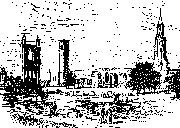
• For more on Puritan sermons, visit Fire and Ice: Puritan and Reformed Writings
• Look at pages from the Bay Psalm Book at the Library of Congress website
Wigglesworth's epic poem is widely regarded as America's first "best-seller," though it was published long before that term came into popular usage. Composed of 224 ballad stanzas, the poem laments the "backsliding" of Puritans into sin and complacency and depicts the final day of Judgement (or "doom") as a series of dramatic confrontations between sinners -- meaning everyone -- and their God. 1,800 copies were published, none of which survive today; historians suspect it was literally read to pieces. We do know that it was commonly used to instruct children (and adults) in the ways of the Puritan faith, and many late-17th century New Englanders probably committed it to memory. Its appearance during the controversy over church membership in the early 1660s (a controversy tentatively resolved in 1662 through the "half-way covenant") probably gave the poem special urgency; at a time when parishioners were falling away from the church, Wigglesworth's poem called them furiously back to it.
When you're reading the brief excerpts from The Day of Doom for precept this week, you might pay particular attention to its style and power of presentation. (Try memorizing a few.) Do you find anything about the stanzas -- their imagery, or sound, or rhythm, for example -- especially moving? Anything that draws the reader in? If so, where, specifically? If not, can you speculate why not? Are there any literary works (or other kinds of writing) today that approximate the tone, style, or subject matter of Wigglesworth's poem? Or has the genre of the "jeremiad" (a writing or speech in a strain of grief, lamentation, or distress) disappeared in the modern world?
We've also asked you to read the introduction to Jane Tompkins's book
on American popular writing, Sensational Designs. As you read
it, try to put Tompkins's notion of "cultural work" into your own words.
After reading, think again of the present day: what kinds of "cultural
work" (using Tompkins's definition) do our best-selling fictions accomplish
today?
|
|
The
Poetry of Michael Wigglesworth (includes full text of The Day of
Doom)
• For more on Puritan sermons, visit Fire and Ice: Puritan and Reformed Writings • Look at pages from the Bay Psalm Book at the Library of Congress website |
The Day of Doom : Or, a Poetical Description of the Great and Last Judgement amazon.com